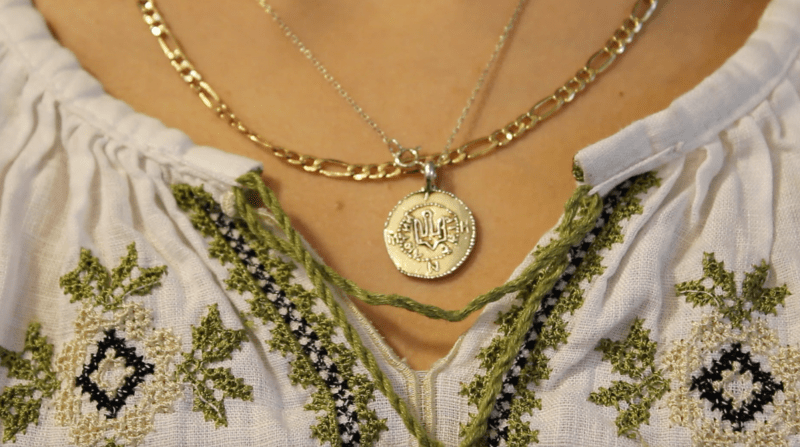Maybe I should shower
and put away some of my things.
Because in 45 minutes,
the whole world is going to come crashing down.
Catarina Buchatskiy 23’ was eating dinner at Theta house on a Thursday night, the last minute of relative normalcy she would experience for a long while, when the thought flashed through her head.
Forty-five minutes later, right on schedule, Catarina — who goes by Cat — watched live as Vladimir Putin announced a ‘special military operation’ to ‘denazify Ukraine.’
“Before he finished speaking, I was already on the phone with my mom,” Cat said. “She had been watching, she was already bawling.”
That first night, Cat got in touch with her fellow Ukranians at Stanford. Together, they watched live streams of the invasion unfolding from a room in EVGR until the sun rose. In the morning, they started to act.
Her days were suddenly impossibly full. Cat led protests, attended speaker events, and spoke with reporters.
“Everyone’s seeing the parts of Cat that I think are so important to her but aren’t always shown on an everyday basis,” Cat’s roommate, Davina Field-Marsham 23’, told me.
Cat describes the days that followed as a blur. Partially, it was a lack of sleep: the fighting was most intense around 3 and 4 a.m. Pacific Time. Cat stayed up every night to watch what was happening to her country.
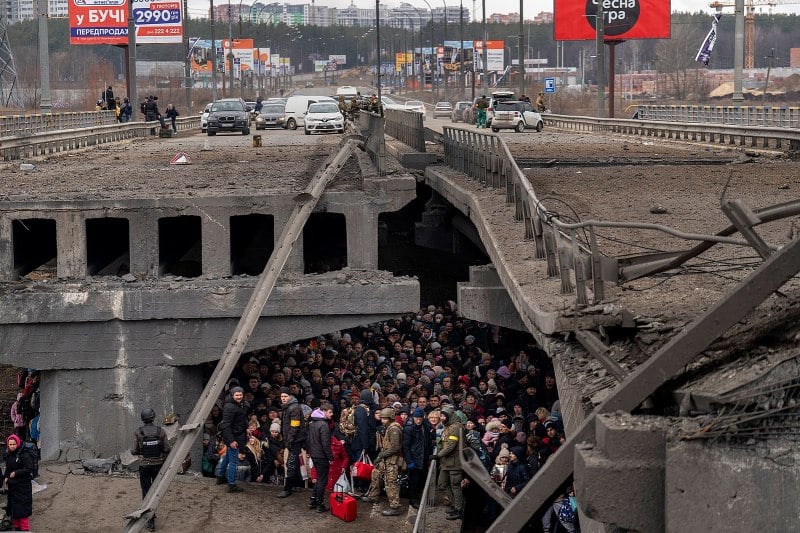
“Seeing her go through it is really, really hard,” says Davina. “She has helped the rest of the Ukrainian students and has touched so many people even within the first week… but she still obviously felt helpless.” Cat couldn’t concentrate on classes, couldn’t stand to watch from the other side of the world as her country burned. She had to go back.
At first, she considered enlisting in the Ukrainian military. As she wrote for the San Francisco Chronicle, “Every instinct in my body tells me to go into Ukraine, pick up arms and fight… and I feel an immense sense of duty to give my life back to it.”
She ultimately didn’t enlist, deciding her talents could be put to better use elsewhere. She still isn’t sure she made the right decision.
The idea of returning to Ukraine — let alone taking up arms — didn’t go over well with her parents: they’d fled Ukraine to the United States back in 2014 in the wake of the annexation of Crimea. “I don’t want my daughter going into a war zone,” her mother told her.
But Cat wouldn’t be stopped. She decided to meet up with her friends in Poland. From there, she could help the refugees, coordinate aid and continue her activism. A few days later, she called her mother again.
“I said, ‘I just want you to know that I’m going [to Poland] on Saturday.’ And that was that.”
“I was happy that her parents were going to let her go,” Davina said. “I think that was the only thing that was holding her back.”
Cat’s departure didn’t come as a surprise to Davina. She and Cat met on the first day of NSO in freshman year, and have been close friends ever since. “I kind of saw it coming,” she explained. “Ukraine is literally Cat’s entire life.”
That’s a sentiment that Cat would probably agree with. “For a lot of the West, this is a breaking conflict that started a week ago. For Ukrainians, we’ve been thinking about this for centuries,” she told me. “In my case, for years.”
Growing Up Ukrainian
Cat’s awakening to her Ukrainian identity came on the day of the ‘Million Man March’ in Kyiv. That day was a key part of Ukraine’s Revolution of Dignity: what started as a protest against the failure of the government to sign a free trade agreement with the EU grew into a full-scale uprising against political corruption and Russian imperialism, culminating in the overthrow of the Ukrainian government three months later.
The day of the march coincided with her 13th birthday. She redecorated her cupcakes in the colors of the European Union, and brought them out to protestors in the streets. “I was so excited to celebrate myself,” she recounted. “Instead, I found myself taking part in something so much bigger.”
On that day, Cat realized that she would never be able to fully distinguish between her personal life and her public one. “There’s no such thing as having a personal life when you can’t have independence in your country,” Cat said.
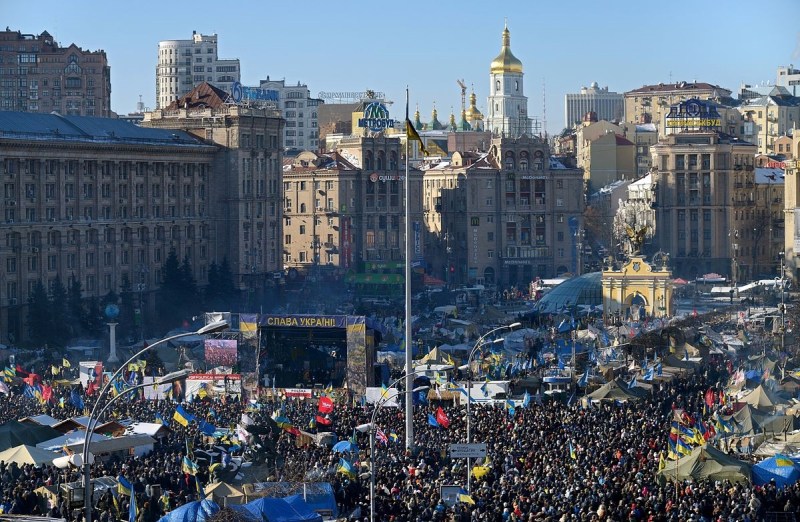
That experience followed her all the way to Stanford University. She chose her major, International Relations, as something she could use to help Ukraine, and began taking courses in Ukrainian History. One of those was ‘Ukraine at a Crossroads,’ taught by professor Yuliya Ilchuk. They had been discussing politics, statehood, and nationalism. All things Cat understood. Until one day, when Professor Ilchuk announced that the class would discuss the Ukrainian avant-garde for that week’s lesson.
“I had no idea what that meant,” Cat recounted. “I came into class very lost on what the relevance of this avant-garde movement was to my life, to Ukraine’s history, and to my story as a Ukrainian.”
That would quickly change. The first artist they learned about was Kazimir Malevich, the founder of the short-lived but influential Suprematist movement. While his works are prominently displayed in museums like MoMA in New York and Tate in London, he was frequently mislabeled as a ‘Russian’ artist – until recently, that is. Although Malevich spent a considerable amount of time in both Russia and Ukraine during his career, he was born and raised in Ukraine and referred to himself as Ukrainian in his autobiography.
This mislabeling turned out to be indicative of a larger trend, Cat explained. “There are so many people that have taken part in building a Ukrainian nation that had just been lost to history or had their voices erased,” she said.
Now, she says she looks back in shame at her 13 year-old self, who thought that Ukraine didn’t have much of its own to offer to the world. “I really regret the fact that I had to grow up that way, because I can’t imagine how many other Ukrainians grow up, not realizing how much they have to fight for and how much they have to be proud of.”
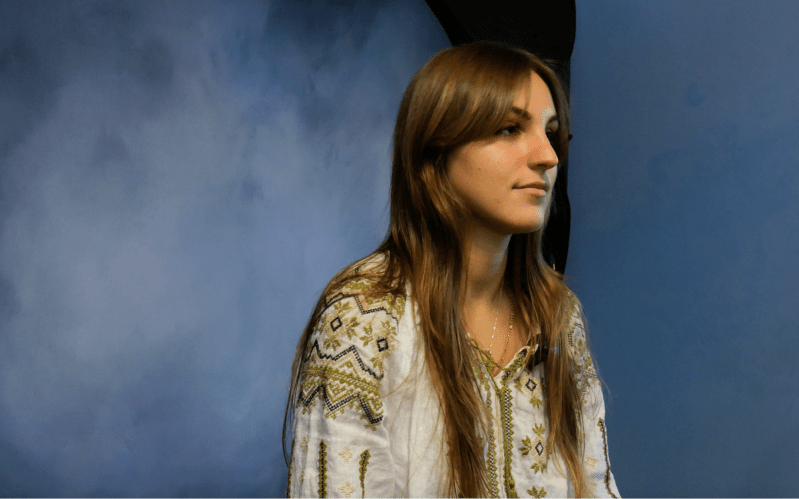
“There's no such thing as having a personal life when you can't have independence in your country,”
Catarina Buchatskiy Tweet
A History of Erasure
The Russian government justifies its war in Ukraine on the grounds of “denazification” and protecting the Donbas region from NATO expansion; Cat sees a different, much older story. “As someone who has witnessed the systematic destruction of Ukrainian states since the 1800s, I knew that this was no different, and that this was not about any kind of new treaties or alliances, or the EU or NATO,” she said. “I knew that this is only the continuation of what has been going on for centuries.”
Putin might concede on that point: in July of 2021, he published an essay titled “On the Historical Unity of Russians and Ukrainians.” The nearly 7000 word article outlined Putin’s argument against the existence of an independent Ukrainian people. Within, he described Russia as the “motherland” that Ukraine has been separated from, and opens his conclusion with the statement that “I am confident that true sovereignty of Ukraine is possible only in partnership with Russia.”
The Russian project to create this conception, Cat explained, has been going on for a long time. Gesturing to the traditional Ukrainian embroidered shirt she was wearing, (known as a vyshyvanka), Cat explained that there was a time when her grandmother couldn’t do the same. “She was a public school teacher during the Soviet Union,” Cat said, “as a public official she couldn’t display any sort of national identity that wasn’t Soviet.”
Cultural erasure took the form of language as well: the repression of the Ukrainian language has a long history dating all the way back to the 18th century. In 1720, the monarch of the Russian Empire, Peter the Great, banned the printing of books in Ukrainian In 1876, Alexander II of Russia issued a similar decree, this time also banning public readings, stage performances, and the importation of Ukrainian-language books. The Ukrainian language enjoyed a brief renaissance after the Russian revolution, but even that faded as Stalin returned to repressive measures.
According to experts, Soviet Rule in Ukraine created a hierarchy of languages: Russian was the language of commerce and the wealthy, whereas Ukrainian was the language of the rural and the poor. Even today, the Ukrainian language is repressed in the Russian-occupied regions of Crimea, Luhansk, and Donetsk.
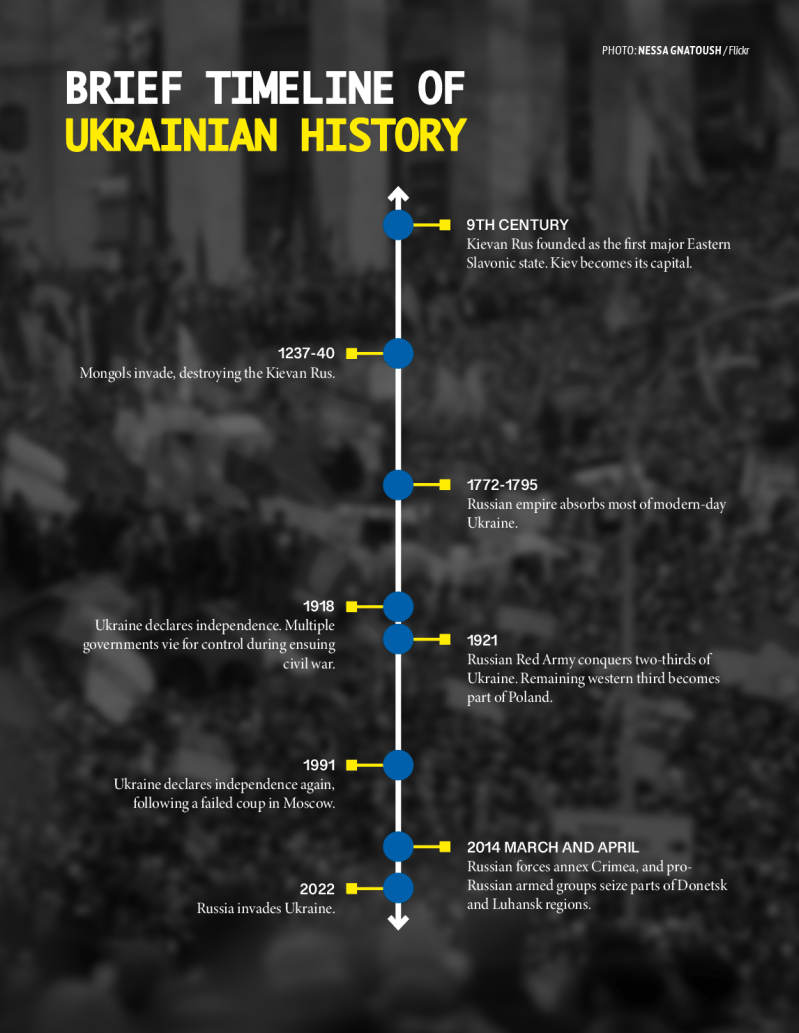
As Cat uncovered this history, she was horrified. Over and over again, Russia had not just attempted to control Ukraine, but to erase it. To take their culture and identity from her and her fellow citizens. It is that indignation that drove her to, in January of 2021, found the Shadows Project along with two friends, Agatha Gorski and Kvitka Perehinets.
The Shadows Project
The Shadows Project is a Ukrainian cultural organization, created with the aim of preserving Ukrainian culture and reminding Ukranians of their distinct historical identity. “It’s about historical autonomy over the narrative, sharing the hidden and repressed sides of Ukrainian culture, and reclaiming a lot of it that is not hidden, but is obscured as Russian,” says Cat.
Up to this point, the Shadows Project has mostly taken the form of an Instagram page, working to make the history contemporarily relevant and engaging to Ukranians in the present. They’ve also partnered with other pages and museums, most recently the Museum of History in Kyiv. They worked “to spotlight narratives and histories of Kyiv that we thought were relevant and important for the new generation of Ukrainians,” Cat described. “[The goal is] to make sure that we’re keeping up a sense of historical continuity, and that every Ukrainian feels like they are a part of this web of history.”
While it may seem that now the war has moved into the world of missiles and bullets, the relevance of the Shadows Project has declined, but to its founders, the exact opposite is the case. “It’s hard to talk about culture and art when there’s hospitals being bombed, there’s people dying,” Agatha explained, “but our heritage is the backbone of our identity.”
Agatha left Kyiv just the day before the war started, and is currently living in Poland. On one hand, she’s glad she isn’t in Ukraine, where she says she’d probably be hiding out in a bomb shelter anways. But knowing that being there wouldn’t do any good doesn’t make watching from safety as her country is ravaged by war any less painful.
“You feel really guilty because you left, because it feels like you know your country is suffering and you want to help in whatever way you can.” On a practical level, though, Agatha knows that continuing to fight for Ukrainian identity is the best thing she can do right now.
For Agatha, continuing to fight for Ukrainian identity is one of the most important ways she can do that right now. “We’re at a very big risk that if we lose our territory, even parts of our territory, it’s a direct attack against our identity or against everything that we can call Ukrainian, so we have to speak out about it.”
At home in Ukraine, that strong sense of national identity and pride has been critical to Ukraine’s continued military resistance against Russia – something many strategic experts thought impossible at its outset.
The morale and resistance shown by Ukrainian troops has been powerfully displayed in multiple publicized incidents, such as the viral audio in which 13 Ukrainian border guards told an approaching Russian warship demanding their surrender to “go f••k yourself,” or President Zelinsky’s choice to stay in Ukraine during the fighting, telling U.S. officials that “I need ammunition, not a ride.”
Meanwhile, Ukrainian civilians have been constructing homemade molotov cocktails and arming themselves with rifles. What Russia underestimated, Agatha explained, wasn’t just Ukraine’s military strength, it was also the strength of Ukraine’s identity: “I think that nobody expected, you know, people to be so fearless and to so bravely defend our country and our identity as they are right now.”
Russia’s military failure’s and Ukraine’s incredible resilience have made it possible – even likely – that the country will succeed in a traditional military defense. But even if that fails, they would still need to suppress rebellions and maintain control. And that seems a near-impossible task.
“Even in occupied cities,” says Agatha, “people are still coming out and they’re speaking out against the Russian invasion.”
Moreover, according to analysis by the RAND corporation, between 10 and 20 troops are required per thousand civilians to maintain control over an insurgent population like Ukraine’s. U.S. Army Chief of Staff General Eric Shinseki gave similar information to Congress in advance of the invasion of Iraq.
Russia currently has four per thousand, and it is unclear that they have the ability to deploy significantly more than that. As Cat wrote, “they can’t possibly keep control over more than forty million Ukrainians that will continue to resist every step of the way.” That resistance will be one predicated on a fierce belief in Ukrainian identity and sovereignty.
“I think that there’s been a lot of misunderstanding [from both Russia and the West] about how strong our notion of our identity and kind of what it means to be Ukrainian is,” says Agatha.
The Shadows Project is a Ukrainian cultural organization, created with the aim of preserving Ukrainian culture and reminding Ukranians of their distinct historical identity. “It’s about historical autonomy over the narrative, sharing the hidden and repressed sides of Ukrainian culture, and reclaiming a lot of it that is not hidden, but is obscured as Russian,” says Cat.
Up to this point, the Shadows Project has mostly taken the form of an Instagram page, working to make the history contemporarily relevant and engaging to Ukranians in the present. They’ve also partnered with other pages and museums, most recently the Museum of History in Kyiv. They worked “to spotlight narratives and histories of Kyiv that we thought were relevant and important for the new generation of Ukrainians,” Cat described. “[The goal is] to make sure that we’re keeping up a sense of historical continuity, and that every Ukrainian feels like they are a part of this web of history.”
While it may seem that now the war has moved into the world of missiles and bullets, the relevance of the Shadows Project has declined, but to its founders, the exact opposite is the case. “It’s hard to talk about culture and art when there’s hospitals being bombed, there’s people dying,” Agatha explained, “but our heritage is the backbone of our identity.”
Agatha left Kyiv just the day before the war started, and is currently living in Poland. On one hand, she’s glad she isn’t in Ukraine, where she says she’d probably be hiding out in a bomb shelter anways. But knowing that being there wouldn’t do any good doesn’t make watching from safety as her country is ravaged by war any less painful.
“You feel really guilty because you left, because it feels like you know your country is suffering and you want to help in whatever way you can.” On a practical level, though, Agatha knows that continuing to fight for Ukrainian identity is the best thing she can do right now.
For Agatha, continuing to fight for Ukrainian identity is one of the most important ways she can do that right now. “We’re at a very big risk that if we lose our territory, even parts of our territory, it’s a direct attack against our identity or against everything that we can call Ukrainian, so we have to speak out about it.”
At home in Ukraine, that strong sense of national identity and pride has been critical to Ukraine’s continued military resistance against Russia – something many strategic experts thought impossible at its outset.
The morale and resistance shown by Ukrainian troops has been powerfully displayed in multiple publicized incidents, such as the viral audio in which 13 Ukrainian border guards told an approaching Russian warship demanding their surrender to “go f••k yourself,” or President Zelinsky’s choice to stay in Ukraine during the fighting, telling U.S. officials that “I need ammunition, not a ride.”
Meanwhile, Ukrainian civilians have been constructing homemade molotov cocktails and arming themselves with rifles. What Russia underestimated, Agatha explained, wasn’t just Ukraine’s military strength, it was also the strength of Ukraine’s identity: “I think that nobody expected, you know, people to be so fearless and to so bravely defend our country and our identity as they are right now.”
Russia’s military failure’s and Ukraine’s incredible resilience have made it possible – even likely – that the country will succeed in a traditional military defense. But even if that fails, they would still need to suppress rebellions and maintain control. And that seems a near-impossible task.
“Even in occupied cities,” says Agatha, “people are still coming out and they’re speaking out against the Russian invasion.”
Moreover, according to analysis by the RAND corporation, between 10 and 20 troops are required per thousand civilians to maintain control over an insurgent population like Ukraine’s. U.S. Army Chief of Staff General Eric Shinseki gave similar information to Congress in advance of the invasion of Iraq.
Russia currently has four per thousand, and it is unclear that they have the ability to deploy significantly more than that. As Cat wrote, “they can’t possibly keep control over more than forty million Ukrainians that will continue to resist every step of the way.” That resistance will be one predicated on a fierce belief in Ukrainian identity and sovereignty.
“I think that there’s been a lot of misunderstanding [from both Russia and the West] about how strong our notion of our identity and kind of what it means to be Ukrainian is,” says Agatha.
Leaving Stanford
When Cat left Stanford campus at the beginning of March, however, whether or not the state of Ukraine would still exist by the end of the month was still uncertain. Cat still didn’t know exactly what role she would wind up playing in the fight for Ukraine. “All I know is that I can’t imagine how I can continue here,” she told us as she packed.
Even so, Cat had a plan for where to start: she would fly to Krakow, Poland. There, Cat met up with Agatha to continue the work of the Shadows Project. They’ve begun using their Instagram page to post safety information for Ukranians, sourcing fundraising, and advocating against the war. “Right now,” says Agatha, “the world is very much ready to listen.”
Cat has written articles in the San Francisco Chronicle and CNN, and Agatha has plans to start a podcast interviewing refugees from Ukraine, telling the untold stories of their journeys and what they had to leave behind.
But as Cat packed her bags in her room at Theta house the night before she left, advocacy wasn’t all she prepared for. She also packed portable battery chargers and cargo pants, a large backpack and a first aid kit. “I had to get a new backpack,” she told us, “because my other one is bright red.” War zone or not, Cat wanted to return home, to stand on Ukrainian soil again.
So she did — as a soldier not in the physical war, but the cultural one, driving across the border with protective equipment to help safeguard Ukraine’s art and artifacts.
“Every instinct in my body tells me to go into Ukraine, pick up arms and fight… and I feel an immense sense of duty to give my life back to it.”
Catarina Buchatskiy Tweet
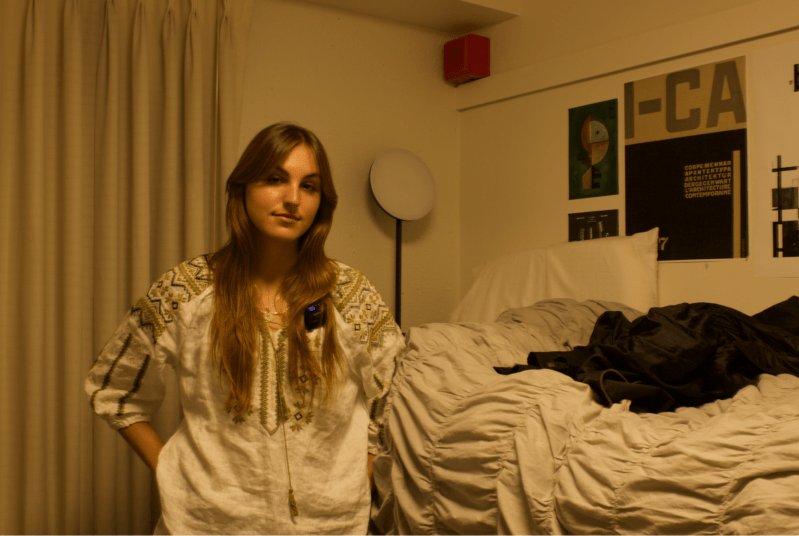
25 works by famous Ukrainian folk artist Maria Prymachenko burned during the Russian assault on Kyiv, and under Russia’s heavy bombardment, still more irreplaceable pieces have come under threat. Among them are some of the earliest examples of human architecture, medieval religious artifacts, and Ukrainian avant-garde paintings. The quest to help protect Ukraine’s culture and heritage has brought her to the Ukrainian city of Lviv, where she is now, distributing equipment to local museums.
Why take the risk for some artifacts and paintings? For Cat, it’s the same reason she started the Shadows Project, and the same reason Russia has tried to erase the Ukrainian identity for centuries: as long as Ukrainian identity stands, so does Ukraine. “Historical memory,” Cat says, “is the battleground of the future.”
As to what comes next, she isn’t sure. “You can’t make plans ahead during a war,” she wrote in a recent email. “I’m just focused on getting to the next day and figuring it out from there.”
For the time being, Agatha is in Paris holding meetings to gather support and fundraising for the Shadows Project’s efforts, Ukraine still stands, and Cat is happy to be home.
“Just standing here physically on my land is already a relief. It’s a relief to know that I’m standing on Ukrainian land, that I can continue to stand on Ukrainian land, and that Russia has not succeeded in taking that away from me, nor will they.”
And while war may make the immediate future turbulent and uncertain, Cat is confident that, in the long run, Ukraine will prevail. “I’ve always believed we had the potential to be a great European power,” she wrote. “This is proving me right.”
Cat currently plans to return to her studies in Stanford in the fall. But for now, Cat says her place is in Ukraine, fighting for her home. “Just being here is also my tiny, tiny act of resistance. They’re trying to wipe us out. They’re trying to destroy the Ukrainian people. Well, now they have one more person that they’ll have to get through.”
